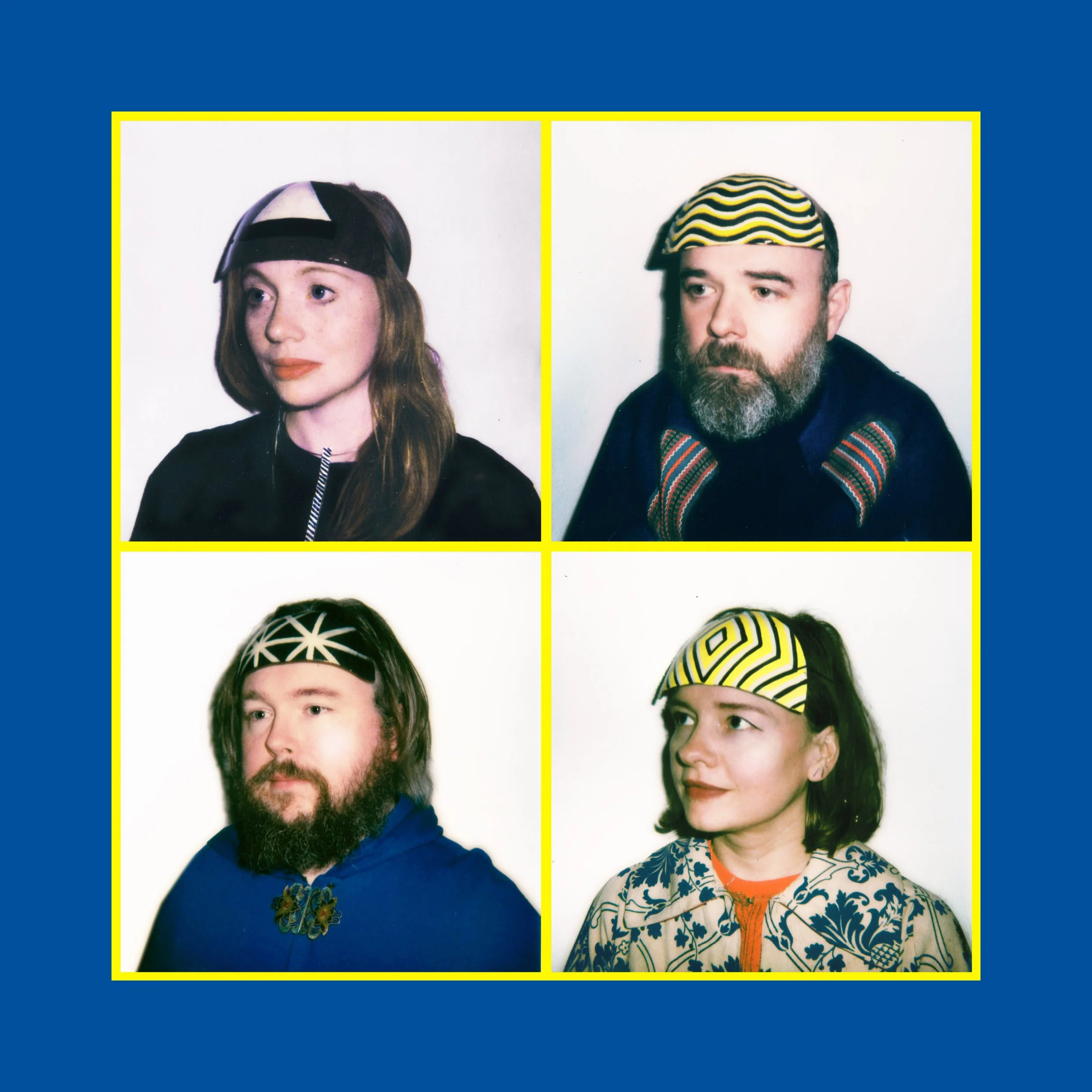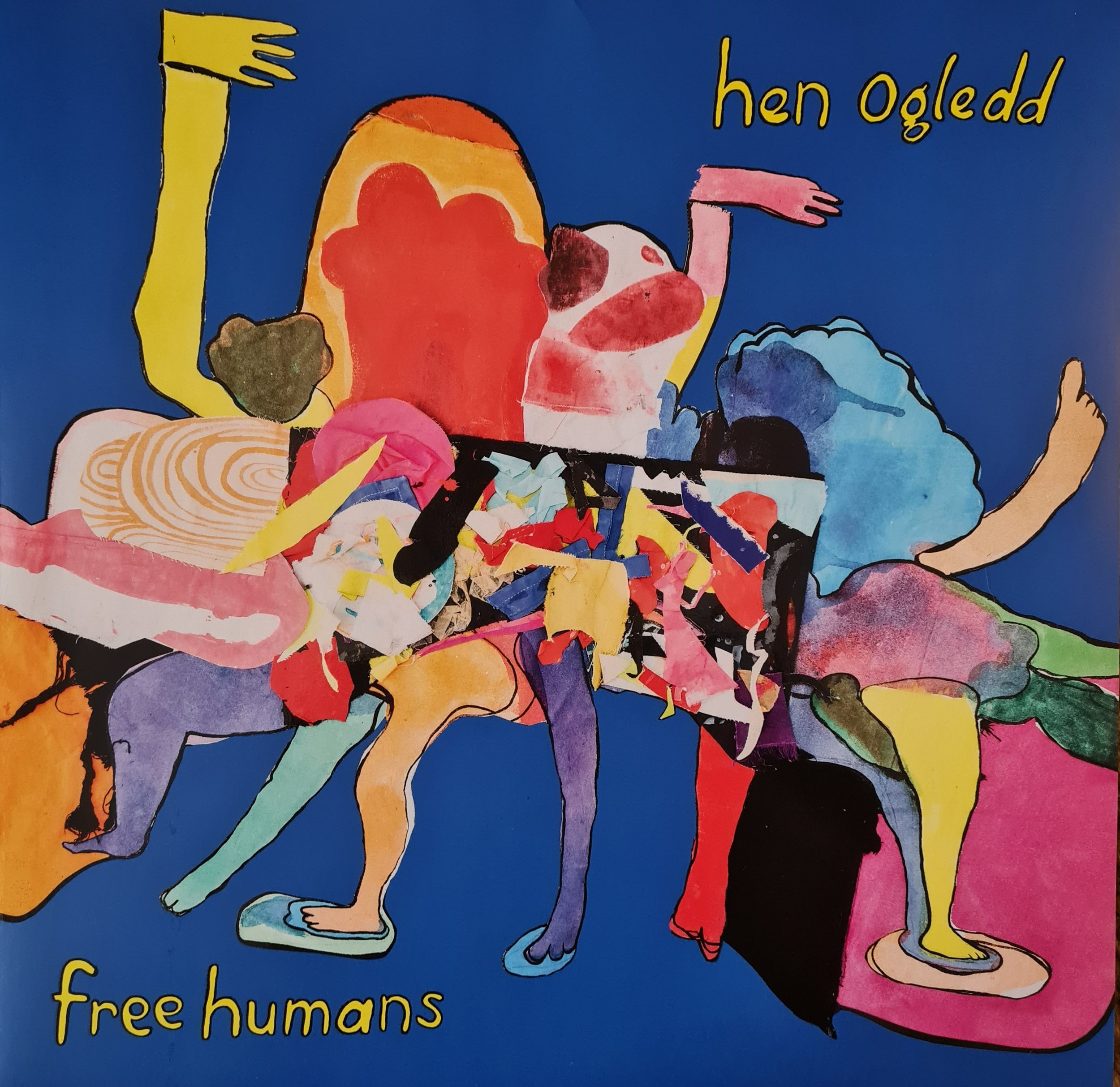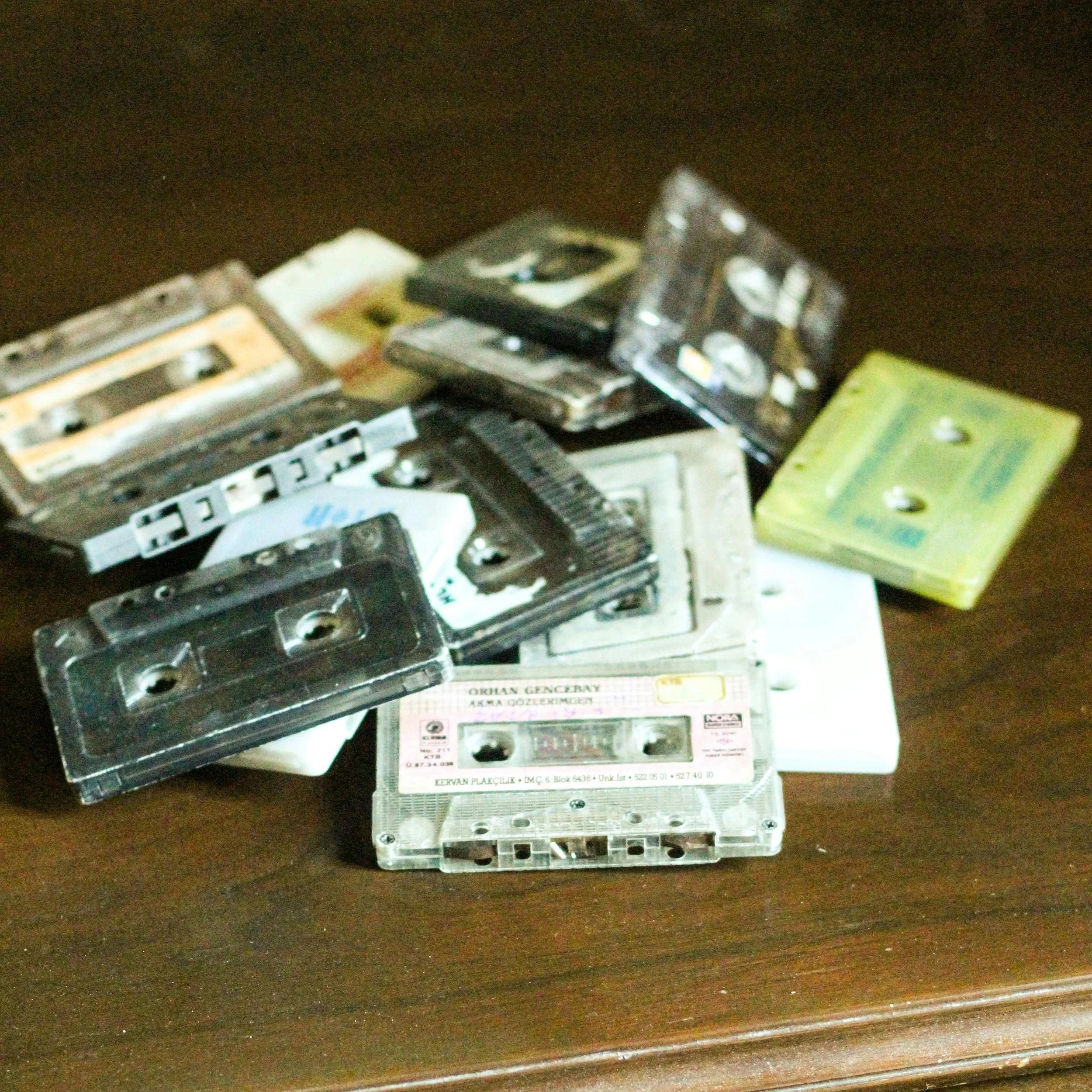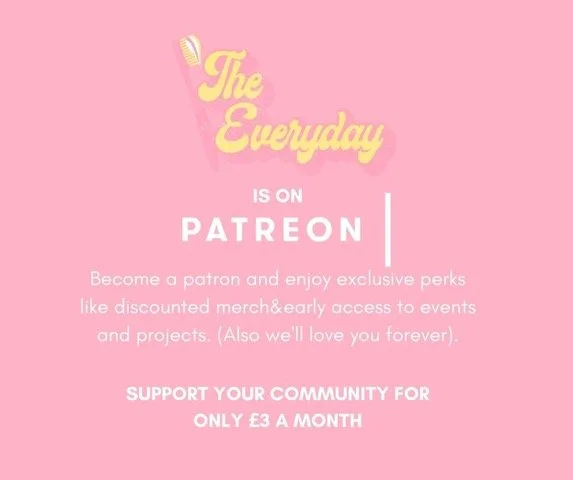Talking To: Hen Ogledd
If you haven’t come across Hen Ogledd yet but love the sound of wonky, folkloric, fluoro-pagan electro-pop you’re just going to love them, believe us. If that doesn’t persuade you, in our opinion, they’re also one of the friendliest, laid back yet interesting group of artists out there.
Formed in Newcastle by prog-folk behemoth Richard Dawson and harpist Rhodri Davies in 2012 as an experimental noise project, they were joined by singer and multi-instrumentalist Dawn Bothwell in 2015 for their third album Bronze. In 2018 artist and musician Sally Pilkington joined the lineup and they signed to Domino Music. In the same year they released Mogic, an album which saw their loose, experimental leanings fuse with a more structured indie-pop sound. Mogic brought Hen Ogledd to the attention of a much wider audience and paved the way for their 2020 album Free Humans, which The Guardian described as ‘a joyous constellation of “wonky” pop, free improvisation and sci-fi musing’.
Their deft, surreal blending of the archaic and the modern is still experimental; peppered with glitchy explorations of space, time-travel and technology, but their synth-heavy fusion of indie, pop and folk, full of soaring vocals, catchy hooks and melancholy means they are a good match for any more mainstream indie or dance outfits out there today.
Following the release of their latest mini-album No Wood Allowed in November 2021 and their December tour, culture editor Kerry Mead caught up with them to talk about the nuts and bolts of how they make music together, reclaiming vocoders, aural time-travel, exactly who plays the sky trumpet and crisp packets on their albums, and where they might be heading next.
For those who might not be familiar with you yet, can you give us a quick rundown of what each of you bring to Hen Ogledd?
Richard: I just play bass. The most boring instrument but it's also the best instrument.
Dawn: And a bit of synthesiser.
Sally: I play synth, which includes some drums occasionally, and vocoder for Tiny Witch Hunter.
You’ve got to love the vocoder on Tiny Witch Hunter. What about you Rhodri?
Rhodri: I'm the electric harpist, and agent provocateur.
I was going to say, and bringer of deadpan humour.
Rh: I'm glad you acknowledge it as humour, at least, that's very kind. It's on the humour spectrum.
D: I play synth as well, and bits and bobs of other things like gargling and chomping.
Rh: And we all sing as well.
D: I was going to say we've got much more exciting throwaway instruments on our album credits including things like crisp packets and celery.
Rh: On the previous album we had stuff like snow trumpets and was it the ‘pipe of the eyes’?
What would you say is the best crisp packet to use for quality of tonal sound?
D: Quavers.
Rh: Dawn is the crisp virtuoso, they can get any sound out of any crisp.
Richard and Rhodri, I know that you made music together anyway and were mates, but tell us about why you decided to work together on a project and form Hen Ogledd?
R: Well, I don't think we did form it really, it was really crap when it was just me and Rhodri. Then Dawn came in and it got interesting, that's really when the band started.
Sally and Dawn, when did you join? And how did you get involved?
S: Hmm, it was Dawn next, wasn't it?
D: I guess me and Sally broke up the band that was formerly Richard and Rhodri. You guys wanted to do some recordings together again, but with some guests, and invited me to come and do an on-site recording in an empty DIY cinema space. It’s moved out of that location now, but when we were in it was all stripped out and echoey and drippy. We just set up some recorders with Sam Grant, the sound engineer, and just messed around. Then we kind of decided to continue doing that after that session.
S: I joined for Mojic. I remember not having a clue what it was going to be like because there wasn't really very much preparation involved. I'm sure we did have some song ideas together, but we just literally went into the recording studio and made the album without having played together before. It was quite daunting, but it was really good. It was with other people, too; with Will Guthrie, who came and played drums and then some other friends who joined for parts of it. It was quite a wild three days.
So you recorded Mojic in three days? That's pretty impressive.
S: We spent lots of time mixing it and doing vocals afterwards, but it was mostly recorded in three days, yeah. Without very much preparation.
Rh: Sally was the only one that wasn't ill during that session. You were ill weren't you Richard? I had a nasty cold. Dawn, you were ill too? You were drinking Irn Bru.
S: Medicinal Irn Bru, it’s the best medicine.
D: Was it a coincidence or did we just make each other ill?
Rh: Sally healed us.
It's pretty obvious seeing you chatting together and also seeing you on stage that you've all got a really good relationship, and Richard and Sally, you’re partners, but have you all been friends for a long time? Or is that something that's flourished since you started working on Hen Ogledd together?
Ri: Me and Rhodri haven't actually spoken for about three years outside of the band.
Rh: We just coexist.
Ri: You know that Sparks track ‘This Town Ain't Big Enough for Both of Us’?
Rh: He forced me out of Newcastle - he sent the Geordie heavies around - I had to leave.
Ri: We've known each other for ages. Me and Sally, before we were going out, we were friends for about ten, maybe fifteen years. When Rhodri moved to Newcastle we both became friends quite quickly, and how long have I known you for Dawn? Probably a bit longer or about the same as Sally? It was, like, right in the midst of the chaos that you appeared from out of a cloud of smoke.
D: I got to know Sally and Richard around the time I moved to Newcastle, me and Sally lived together for a little while in a co-op, and then I met Rhodri a little bit later because he was so aloof.
Rh: I was quite shy. Shyness is often mistaken as aloofness.
So your earlier releases before Dawn and Sally joined - I know you mentioned earlier you think they're crap - but they've got a really different, more freeform and experimental sound and feel. Do you think Hen Ogledd’s sound changed because Dawn and Sally joined in? Or was there a moment when you decided ‘right, let's get other people in as we want to make something different - more mainstream and focused’?
D: I think it mostly changed when Sally joined, because I think when we did Bronze, it was still quite open and unstructured, I guess, or maybe there was a little more structure creeping in. I think we also just kind of decided to try something else at that point.
S: Yeah. I think with Mogic, it was a group decision to do something more poppy and that kind of stuck. We might move away from that to the next thing in the future.
Who out of you has got the big love affair with pop going on, and what do you love about it? Or is it all four of you?
S: I think all of us love pop.
D: It's a weird one, pop, isn't it? Because what you would think of as pop now, chart music, is really different to what springs to my mind, which is more of a 80s and 90s style of pop, a more intelligent pop.
How do you work the nuts and bolts of writing and recording together? Have you all got quite set roles, or do you all just jump in and create stuff together?
S: I think we've all contributed to all areas of the songs in a way. With the last two albums, we all brought the main chunk of a song, whether it was some words or chords, so there are songs that are more written by one person. And then I suppose the rest of it comes in from the instruments that we're playing. Also, Dawn and me are doing more of the vision-driven side of things.
So it sounds like it's quite a democratic process, or is there somebody who has the last say?
Rh: I think he's called Richard.
S: Sometimes in the mixing, I feel like he might have had the last say, but it's mainly because he was paying the most attention.
Hen Ogledd live at Strange Brew Bristol, December 2021.
R: I'm keeping quiet! But I think it's democratic. You know, at the end of the day, everyone has to be happy with it, there's no hierarchy in the band, that’s very important. I can imagine the next album will be different again, Mogic and Free Humans were very different, how we made them and how it all worked. It's just where people are at at the time I think, and what they're available to and what their mind is geared towards in that moment. Nobody in the band is making a decision for their own benefit. It's all about trying to get the record or the show to where it needs to be.
You cover quite a lot of different ground in your music. I wanted to talk first about what experiences and ideas shape your music and lyrics.
Rh: Sometimes we have a very loose theme. We also have some themes that we discard, yet sneak them in regardless, like Dawn's sewage one! We didn't get that excited about it, but you managed to get it in there, didn't you? Getting rid of waste into space or something, wasn't it?
D: It's back on the list for the next album. I was just thinking about the sort of trope of sewage in outer space and all of our detritus as human beings; what if it was shot into outer space? Or buried under a mountain as a lot of it is? It was just freewheeling with those ideas, really, of what excess is and how it's turned revolting and rotten.
Rh: ‘Remains’ was partly about the vocoder. Vocoders get a lot of bad press, and it's actually an incredible invention, what you can do with it. I looked into the history of it and discovered that little sound sample that we use on Remains at the beginning and the end, which was the first demonstration of the vocoder. I was trying to just draw people's attention to our fantastic vocoders historically, yet it is a very much maligned instrument, you know? Let’s reclaim these poor instruments that have been either misused or overused!
And I love the fact that on your latest EP No Wood Allowed you can chuck in a version of My Little Donkey alongside a fantastic rant about tips in Swansea.
S: I think each song has come about quite individually, hasn't it? Even if we've generally had a theme or a few themes that we've suggested, then actually what has come out has been quite a random collection. With Free Humans we're definitely just responding to desperation; the state of affairs with Brexit and politics in general. Free Humans is some kind of solidarity response to that.
You definitely get a feel for that from the album. But there is a lot of humour in your music as well. Is it important to you to create something joyful, as well as tackling some of the big issues around politics and the human condition?
S: Yeah, I think so. I think if you’re being serious and political, it's good to keep some fun in there and keep it a bit light.
D: We do have a Karl Marx quote in there though, just to contradict that.
Ri: Part of it as well is that we're not overly serious in how we communicate with each other in an everyday way, so it's nice to bring that to our music. I don't want to speak for anyone else but we're not making a conscious effort to be funny, but we’re also not shying away from those more serious things. It could be a bit po-faced otherwise.
I suppose it's like that with a lot of things. I think the album taps into it; it’s a very melancholy album, but there's a kind of ridiculousness to it. But that seems an appropriate response to the levels of ridiculousness that we're facing right now. Maybe it's in the mix; a slight manic thought, which I definitely feel is a lot easier to tap into after the last couple of years. A kind of anxiety at play underneath the surface of everything.
Hen Ogledd’s music blends together loads of different opposites as well as seriousness and humour, but also stuff like the ancient and the modern or technology versus acoustic music. It creates something new and original. Is that something you set out to do or did that just naturally happen and become part of your style?
Rh: I think maybe it comes from us allowing each other to do whatever we want. I know some band models are hierarchical; you'll have the songwriter who will dictate stuff and you'll get just one viewpoint, but with Hen Ogledd I think there is an openness to everybody's views and input and tangents and misdirections. That's how there's this cauldron of stuff that appears.
S: And I suppose just the instruments that each of us brings adds to this; you know, synthesisers and drum machines and then just a guitar. And the harp kind can be both ancient and modern. I don't feel like it's particularly intentional or planned, it just kind of happens
Your music plays with time a lot as well. Time is mentioned a lot and you can tell a lot of the influences are coming from very different eras. Again, is that something that you do consciously?
S: I feel like time is a constant theme for Hen Ogledd, definitely. It's part of just wanting to zoom out and look at the ridiculousness of it all, of humanity throughout the ages, and seeing where we're going as well.
You've got to be able to consider the past to get an idea of the future, haven't you really?
D: Yes, and it gives you some hope as well, looking at disastrous situations when eventually everything just disappears anyway.
Rh: Haha, that is very hopeful!
Carrying on with the ancient theme, Hen Ogledd is an archaic Welsh term for the Old North. Why did you choose this? Are your roots really important to you all, or did you decide on the name because you are all from Scotland, Newcastle and North Wales?
Rh: I’ve always been interested in the story of the Hen Ogledd since I learnt about it in school in Wales, because it's largely unknown in some parts of England. Even when I was in Newcastle going out for drinks with people some of them had never heard of it and didn’t know that people used to speak an ancient Welsh language there at one time. I just got really excited wandering around up there and finding all of these amazing places with Welsh names, and discovering some of the history there and learning about it first hand after just reading about it in school. I love the area and I love the people up there. It didn't work out like this but the band members have the Hen Ogledd connection, as it stretches up to parts of Scotland and down to where Sally’s from, so it just resonated. It was kind of a nice little thing that brought us together somehow.
‘Free Humans’ cover.
You released Free Humans in 2020; was it hard to get the album recorded and released during the pandemic?
D: It helped that we recorded it before the pandemic, then as the pandemic was kicking in it was being mastered at Abbey Road and there was this extremely urgent rush to sign it off before they got shut down. We were really lucky in a sense that in terms of the production it wasn't affected too much by covid. When it came to launching it, the promotional stuff and videos were produced during lockdown so that took a bit of extra ingenuity and negotiation for Debbie who made the two videos for the album. There were some outdoor back garden shoots with DIY screens in the background and things like that!
How about No Wood Accepted, which was released last November?
Ri: I think everything on No Wood Accepted was recorded before, so that was okay. We have not been together and recorded in some time. We did the Star and Shadow Cinema streaming show [Free Humans album launch party] and that was where we did Little Donkey, but apart from that we haven't got together and worked on anything since before 2020.
How has the success and positive reception of Free Humans felt for you?
Ri: I actually feel like Free Humans disappeared a little bit - I kind of hoped it would get out there a bit more, personally,
S: I don't have much conception of it, but I think my perception of how our albums have gone down has been from playing gigs after they have come out and we just haven't played many gigs since Free Humans. That's partly why it feels like it's disappeared a little bit, because we haven't really had that chance to play it to people and make that connection with people who have listened to it. It's quite a strange thing.
D: There’s definitely that unmediated response that you get from people at live gigs that gives you a proper idea of how your material has been received. I guess especially with the kind of gigs that we usually play, we are out and about and tend to bump into people who have heard us, and you usually get a very honest and direct response from people.
Rh: As an experimental musician who has played improvised music for years I was just delighted to have any attention, to be honest! There's more than one person in the audience!
I saw you live in December, and when you are all up on stage it's easy to see, and from the great atmosphere at your gigs, that you really do enjoy being on stage together. Would you say that the live performance element and getting that feedback, as you said Dawn, is something you like as much as making the music itself, or more?
D: I guess it's a bit of both really, the two experiences are so different.
Ri: It's not really comparable for me, I just love being in the studio. I think I feel less comfortable on stage with Hen Ogledd because I'm less confident playing the bass, but I feel a lot more relaxed as well, because it's less pressure than doing my solo thing.
D: It’s a funny one because I've never been that comfortable performing in front of people - I've always forced myself to do it - putting myself into situations where I have to do it. I do solo stuff myself but playing with Hen Ogledd is great because when you get up there, and just before, you're all just cracking jokes and relaxing each other through camaraderie. It is great for your nerves, it just makes things calm down and disappear.
What's happening for Hen Ogledd next? Have you got any dates or new music coming out, or do you have lots of ideas just brewing away?
Rh: We're playing Doune the Rabbit Hole festival in Stirling in July - that was a festival we were meant to do last year but it got postponed, so that's exciting. And I actually wrote eight chords in F Major the other day which I was quite excited by.
Ri: Were they all F Major?
Rh: No, they were in the key of F Major. I won't spoil it and tell you the chords, but I was quite pleased.
Ri: Well done, we're all proud.
S: We've been pipedreaming about going to Rockfield, which is a residential studio where you can go and stay out in the countryside and record, but I think it might be too expensive.
Ri: I think we might have to just hire out a conference room in an IBIS hotel or something like that.
Rh: We'd get lots of biscuits in the morning, let's do it!
Ri: I think it's a weird period at the moment because we have no idea what the band is right now - it is not what it was and we've no idea what it will be, which is quite a good place to be really.
S: We need to call a band meeting right now! We need to make a plan!
Find Hen Ogledd and their music on Bandcamp, their website and at Domino Records. To keep up to date with wherever they end up next you can follow them on Twitter and Instagram. Because wherever it is, it’s going to be pretty cool.









